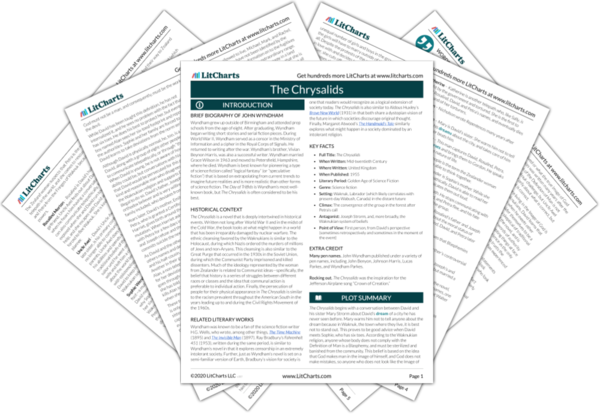Words and language are at the heart of The Chrysalids because it is David’s ability to communicate wordlessly that makes him a Blasphemy. This ability frightens the leaders of Waknuk not only because David might be able to plan a secret uprising against them, but also because David’s existence challenges the authority of the words on which the leaders’ power is based. By classifying David as a Blasphemy, however, the leaders of Waknuk contradict the very words that they so strongly espouse. Up until this point, a Blasphemy was described as someone who did not look like the Image of God and differed from the Definition of Man. David, on the other hand, fits perfectly within the Definition, as his telepathic powers don’t affect how he looks and are unmentioned in the Definition. His existence proves that the words contained within Repentences are not perfect or all-encompassing, and that the ideas promoted within them are opinions rather than facts.
The adages from the Repentences that fill the houses of Waknukians are meant to be powerful statements of the importance of conformity, but Uncle Axel points out that they are not powerful because they are not backed up by any sort of introspection. Waknukians memorize and repeat these proverbs, but they hear them so often that they never think about what they actually mean. Indeed, David often points out that even though he knows these maxims by heart, he has not internalized their meaning. David generally finds words to be much less effective tools for communication than thought-images, which are more immediate and nuanced units of communication.
While the novel clearly questions the power of language by contrasting it with telepathy, it also suggests that there are benefits to language that thought-images cannot claim. Indeed, the physical and aural manifestations of language keep David safe in situations that invisible and inaudible thought-images could not, like when Rachel saves the group by destroying the words of her sister. Further, Wyndham, the novelist, must himself rely on words to communicate his story to his readers. Although he imagines many benefits of collective thinking and telepathy, it is not at all clear from his novel that this is truly a superior way of operating.
Words ThemeTracker

Words Quotes in The Chrysalids
“And God created man in His own image. And God decreed that man should have one body, one head, two arms and two legs: that each arm should be jointed in two places and end in one hand: that each hand should have four fingers and one thumb: that each finger should bear a flat finger-nail.”
“And any creature that shall seem to be human, but is not formed thus is not human. It is neither man nor woman. It is a blasphemy against the true Image of God, and hateful in the sight of God.”
“The nearest approach to decoration was a number of wooden panels with sayings, mostly from Repentences, artistically burnt into them. The one on the left of the fireplace read: ONLY THE IMAGE OF GOD IS MAN. On the opposite wall two more said: BLESSED IS THE NORM, and IN PURITY OUR SALVATION. The largest was the one on the back wall, hung to face the door which led to the yard. It reminded everyone who came in: WATCH THOU FOR THE MUTANT!”
“‘I only meant if,’ I protested. I was alarmed, and too confused to explain that I had only happened to use one way of expressing a difficulty which might have been put in several ways.”
“A word…a rusted mirror, reflecting nothing. It’d do the preachers good to see it for themselves. They’d not understand, but they might begin to think. They might begin to ask themselves…Are we right? For it is clear, boy, that however wonderful the Old People were, they were not too wonderful to make mistakes—and nobody knows, or is ever likely to know, where they were wise and where they were mistaken.”
“But what’s got them so agitated about us is that nothing shows. We’ve been living among them for nearly twenty years and they didn’t suspect it. We could pass for normal anywhere. So a proclamation has been posted describing the three of you and officially classifying you as deviants. That means that you are non-human and therefore not entitled to any of the rights or protections of human society.”
















